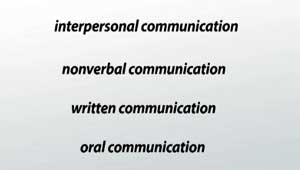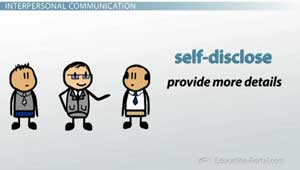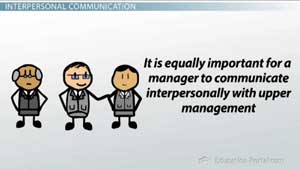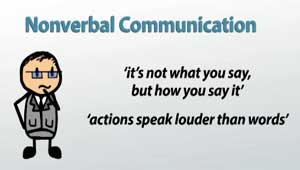Types of Communication: Interpersonal, Non-Verbal, Written & Oral - Quiz
Choose your answer and write the correct one down. Then click HERE for the answers to this quiz.
NOTE: The transcript from the video is listed below the quiz for your reference.
1. The four most common types of communication used by managers include the following except
- mass communication
- oral communication
- nonverbal communication
- written communication
- interpersonal communication
2. ___________can be described as communication between a small group of individuals, typically in a face-to-face setting, where participants engage in minimally restricted dialogue with each other.
- mass communication
- oral communication
- nonverbal communication
- written communication
- interpersonal communication
3. ___________ refers to messages that are transmitted to receivers in writing.
- mass communication
- oral communication
- nonverbal communication
- written communication
- interpersonal communication
4. ___________ is anything besides words, such as gestures, actions, facial expressions, body language, and other aspects of your physical appearance that, when seen, communicate something.
- mass communication
- oral communication
- nonverbal communication
- written communication
- interpersonal communication
5. ___________ implies communication through the spoken word or using your mouth.
- mass communication
- oral communication
- nonverbal communication
- written communication
- interpersonal communication
This lesson distinguishes between the various methods of communication used by managers, including interpersonal communication, nonverbal communication, written communication and oral communication.
Spice is the Variety of Life
It's almost dinnertime, and your in-laws are in town for the evening. You desperately want to impress them with your cooking skills and have spent countless hours researching the perfect meal to prepare for them. You have chosen a dish that is straight from their ethnic heritage, and you know that you have to get the spices right, choosing the right blend and using them at the most optimal time to enhance the flavor of your dish. After much consideration as to what you need to do and the best way to do it, you manage to pull it off perfectly!
Communication, like spices, comes in a variety of types. While having a variety is nice, it is important to know which one to use and at what time to maximize your success, much like preparing the meal for the in-laws. Let's take a look at the four most common types of communication used by managers, including interpersonal communication, nonverbal communication, written communication and oral communication.
 |
Interpersonal Communication
One of the most important - if not the most important - forms of communication a manager will engage in on a daily basis is interpersonal communication. Interpersonal communication can be described in a variety of ways, but when we examine what it means in the context of management, we can define interpersonal communication as communication between a small group of individuals, typically in a face-to-face setting, where participants engage in a minimally restricted dialogue with each other.
The reason I say it is 'minimally restricted' is because individuals who engage in interpersonal communication share some level of familiarity with each other, making them more likely to self-disclose information, or provide more intimate details than one would with a stranger, for example.
 |
Managers who engage in interpersonal communication with their subordinates demonstrate that they not only care about the organization, especially one that uses teams, but also care about their employees. Taking the time to get to know who your employees are will make them feel valued. This is not to say that every employee will want to get to know you on a more personal level but it at least tells them that you would like to. The more valued the employee feels, the fewer barriers they feel they need to build around them and the more easily information flows. As barriers come down, relationships are formed that create value within the organization, job satisfaction increases and the workplace becomes a place where everybody likes to be.
 |
It is equally important for a manager to communicate interpersonally with upper management, as well. Since managers serve as a gatekeeper of information between upper management and subordinates, an effective manager understands their role in keeping the lines of communication open. When organizational information fails to reach its intended recipient, the entire organization can suffer.
Nonverbal Communication
Did you know that the majority of what you communicate to people on a daily basis is done without words at all? This is also true for managers. Put simply, nonverbal communication is anything besides words, such as gestures, actions, facial expressions, body language and other aspects of your physical appearance, that, when seen, communicate something. I am sure that you've heard the saying 'it is not what you say, but how you say it' or perhaps 'actions speak louder than words.' Managers send, receive and interpret nonverbal messages the same way they would oral or written communication.
 |
Still, understanding the significance of nonverbal communication can be troublesome for managers because it is such a normal part of any managerial action. Our nonverbal communication is as automatic as breathing because we do it without thinking about it most of the time. Even though nonverbal communication accompanies oral communication as an extension of a particular message, the two do not always align. Because nonverbal communication is often used without consideration, inconsistencies between oral communication and nonverbal communication can occur. Effective managers understand and are aware of their nonverbal communication, ensuring consistency between their spoken communication and their nonverbal communication.
Written Communication
While managers spend most of their time communicating with their subordinates and upper managers in a face-to-face setting, they also spend a good deal of time writing memos, letters, e-mails and reports. Written communication refers to messages that are transmitted to receivers in writing. Advantages of written communication include:
1) Immediacy and economical feasibility - A manager can communicate a message quickly to individuals despite their geographical location. Email is less expensive than long-distance phone calls and certainly less than travel expenses, especially when a message needs to be conveyed to a large group.
2) Efficiency and accuracy - Written communication allows for reflection, affording a manager the opportunity to refine a message for correctness.
 |
4) Official record - Written communication provides a formal record of messages being sent and received. The major limitation of written communication is that you cannot always confirm that a message was received by the intended recipient. Writing skills can also be an area of concern for managers who use written communication. A manager must spend time polishing their writing skills to ensure that written messages are sent in a clear, concise, organized and accurate manner.
Oral Communication
Oral communication implies communication through the spoken word, or using your mouth. A manager would use oral communication for a variety of things, such as meetings, interviews, performance reviews, presentations, trainings, soliciting and providing feedback to subordinates or when communicating progress to upper management.
The list of things a manager can accomplish using oral communication is expansive. Managers tend to rely heavily on oral communication because of the advantages associated with ensuring a message was received, checking for understanding and soliciting immediate feedback. However, oral communication can also be inconsistent, incomplete and ambiguous, which all allow for inferences to be made. As explained previously, much of a manager's day is spent conversing with subordinates and upper management. Consequently, effective listening and speaking skills are critical for managerial success.
Lesson Summary
Let's review. The four most common types of communication used by managers include interpersonal communication, nonverbal communication, written communication and oral communication. Interpersonal communication can be described as communication between a small group of individuals, typically in a face-to-face setting, where participants engage in minimally restricted dialogue with each other. Nonverbal communication is anything besides words, such as gestures, actions, facial expressions, body language and other aspects of your physical appearance, that, when seen, communicate something. Written communication refers to messages that are transmitted to receivers in writing. Oral communication implies communication through the spoken word, or using your mouth. Each type of communication has its advantages and disadvantages making it imperative for managers to work on effective skills related to interpersonal communication, nonverbal communication, written communication and oral communication.